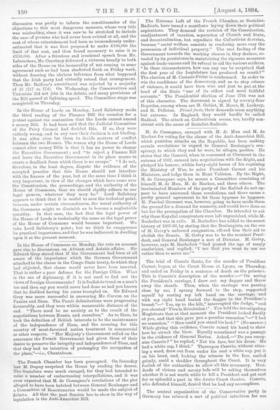In the House of Lords on Monday, Lord Salisbury made
the third reading of the Finance Bill the occasion for a protest against the contention that the Lords cannot amend a money Bill. It had been said that the Judicial Committee of the Privy Council had decided this. If so, they were entirely wrong, and in any case their decision is not binding. It was ultra vireo for them to decide matters of conflict between the two Houses. The reason why the House of Lords cannot alter money Bills is that it has no power to change the Executive Government ; and "to reject a Finance Bill and leave the Executive Government in its place means to create a deadlock from which there is no escape." "I do not, therefore, in the least degree, dispute the evidence of the accepted practice that this House should not interfere with the finance of the year, but at the same time I think it very important, in view of the changes which have come over the Constitution, the proceedings, and the authority of the House of Commons, that we should rigidly adhere to our legal powers, whatever they may be." Lord Salisbury appears to think that it is useful to save the technical point, because, under certain circumstances, the moral authority of the Commons might so diminish as to become a neglectable quantity. In that case, the fact that the legal power of the House of Lords is technically the same as the legal power of the House of Commons would become important. We take Lord Salisbury's point ; but we think he exaggerates its practical importance, and that be was indiscreet in dwelling upon it at the present moment.


































 Previous page
Previous page